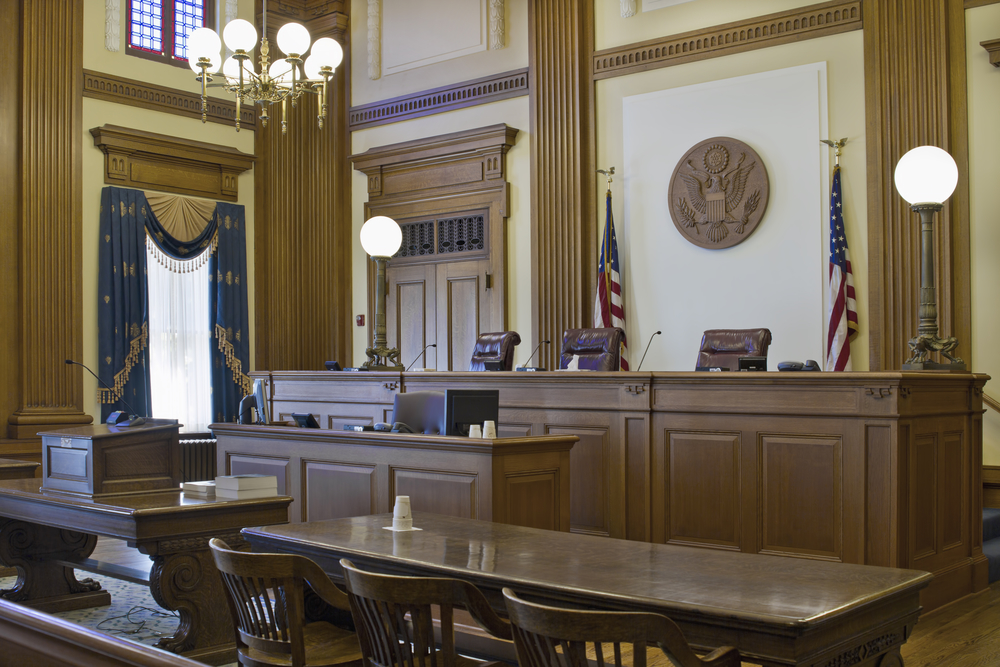The Supreme Court of New Jersey recently agreed to add another key case involving the state’s Open Public Records Act (OPRA) to its docket. Paff v. Ocean County Prosecutor’s Office revolves around the disclosure of police video recordings, which has become a high-profile issue in the wake of several controversial police-involved shootings.

Facts of the Case
Plaintiff John Paff sought police dash cam recordings of an incident involving a Tuckerton Borough police officer’s arrest of a driver for several motor vehicle offenses. The arrest later resulted in charges of police misconduct. The Ocean County Prosecutor’s Office refused to provide the recordings, citing that they were exempt from disclosure under OPRA as “criminal investigatory records.”
In the lawsuit that followed, the trial court ordered the police video recordings to be disclosed pursuant to OPRA. By a vote of 2-1, a divided Appellate Division affirmed. It held that OPRA’s “criminal investigatory records” exemption, as well as the “investigation in progress” exemption, did not apply to the police dash cam recordings. In reaching its decision, the majority noted that “OPRA’s clear purpose . . . is to maximize public knowledge about public affairs in order to ensure an informed citizenry and to minimize the evils inherent in a secluded process.”
OPRA Issues Before NJ Supreme Court
On appeal, the New Jersey Supreme Court has agreed to consider the following question:
Among other issues, does this police vehicle’s video recording of an arrest fall within the “criminal investigatory records” exemption to the Open Public Records Act (OPRA), N.J.S.A. 47:1A-1 to -13; and, if the video recording is subject to disclosure, can the arrestee’s privacy-based objection justify withholding the recording?
Oral arguments have not yet been scheduled. We will continue to closely monitor the case and post updates as they become available.
For more information about the OPRA case or the legal issues involved, we encourage you to contact a member of Scarinci Hollenbeck’s Government Law Group.
In IMO Robbinsville Twp BOE v. Washington Twp Educ. Assoc., the Supreme Court of New Jersey significantly narrowed its 2015 decision in IMO Borough of Keyport. In so ruling, the court reversed what it saw as an improper expansion of its ruling to authorize a school board to unilaterally impose unpaid furlough days.

Keyport Decision
In IMO Borough of Keyport v. Local 68, the Supreme Court of New Jersey addressed whether three municipalities were required to negotiate with union representatives before taking layoff actions that negatively impacted the hours and wages of affected employees. The state’s highest court concluded that because the temporary layoffs occurred during times of fiscal distress they were not subject to negotiation under existing Civil Service regulations. It held that the municipalities “acted for reasons of economy based on municipal fiscal distress existing at the time, rendering the management choice to use a temporary or permanent layoff solution one that constituted a managerial prerogative not subject to negotiation.”
In Robbinsville, the New Jersey Supreme Court considered whether Keyport “supports a general proposition that, in times of economic crisis, a school board may unilaterally impose furlough days on teaching staff members in contravention of the parties’ collective negotiation agreement governing terms and conditions of employment.”
Facts of the Case
In response to fiscal challenges, the Robbinsville Township Board of Education (Board) announced a plan to impose involuntary furlough days on teachers with the knowledge the furloughed days would negatively impact the affected employees’ wages. The teachers’ union filed an unfair labor practice charge with the Public Employment Relations Commission (PERC). It alleged that the Board’s action violated the parties’ collective negotiation agreement and the New Jersey Employer-Employee Relations Act (EERA).
PERC granted summary judgment to the Board, relying on the Appellate Division’s decision in Keyport. The Washington Township Education Association (Association) appealed, and the Appellate Division affirmed PERC’s determination. The appeals court reasoned that the New Jersey Supreme Court’s decision in Keyport supported the Board’s ability to act unilaterally to impose the furloughed days.
Court’s Decision
The New Jersey Supreme Court reversed. “Because the Appellate Division decision is based on an overly broad and mistaken reading of our determination in Keyport, we reverse to correct the judgment and to prevent improper expansion of our circumscribed holding in Keyport,” Justice Jaynee LaVecchia wrote.
In its decision, the New Jersey Supreme Court emphasized that Keyport does not authorize the Board’s unilateral alteration of a collective negotiated agreement. As Justice LaVecchia explained:
The appellate decision undervalued the lack here of an authorizing temporary emergency regulation that permitted temporary furloughs -– a factor that had the significant impact of tilting the public policy calculus in Keyport’s analysis under the third prong of Local 195. Keyport does not stand for the proposition that anytime a municipal public employer can claim an economic crisis, managerial prerogative allows the public employer to throw a collectively negotiated agreement out the window. To the contrary, Keyport painstakingly emphasized the significance of an agency of State government enacting a temporary emergency regulation to provide local governmental managers with enhanced prerogatives in handling the extraordinary fiscal times faced in the late 2000s. The regulation’s existence made all the difference in Keyport.
The decision clearly impacts the reach of Keyport. In the absence of regulations authorizing furloughs, municipalities and school boards are more limited in how they respond to challenging economic conditions.
For more information about the Court’s decision or the legal issues involved, we encourage you to contact a member of Scarinci Hollenbeck’s Government Law Group.
In Gilleran v. Township of Bloomfield, the Supreme Court of New Jersey held that security footage from a camera located outside a town hall was not subject to disclosure under the Open Public Records Act (OPRA). According to the state’s highest court, “Compelling release on demand of security surveillance video would be contrary to the legislative intent motivating OPRA’s exemptions based on security concerns.”
The Facts of the Case
Plaintiff Patricia Gilleran requested one day of video footage from a security camera attached to the Bloomfield Town Hall. The Township denied Gilleran’s request, citing OPRA’s security exceptions, which protect “emergency or security information or procedures for any buildings or facility which, if disclosed, would jeopardize security of the building or facility or persons therein,” as well as “security measures and surveillance techniques which, if disclosed, would create a risk to the safety of persons, property, electronic data or software.” Gilleran subsequently filed a complaint in the Law Division seeking the requested footage under OPRA and the common law right of access.
In the court proceedings that followed, she argued that the camera is in plain sight and captures video of a public area. She further contended that the videotape is a government record subject to access under OPRA and that the Township should either grant her request in full or review its tapes, redact any exempt portions, and release the remainder.
Meanwhile, the Township maintained that disclosing the footage could compromise the safety of visitors to the Law Enforcement Building adjacent to Town Hall, including confidential informants, witnesses, domestic violence victims, and members of the public who seek to report crimes. Bloomfield further argued that disclosure would jeopardize the security measures it has taken for Town Hall and its adjacent parking area and police building.
The Appellate Division upheld the trial court’s ruling that the Township had violated OPRA, holding that “Bloomfield did not satisfy its burden of proving the requested recordings are exempt from disclosure through the general statements of its Administrator and its argument for a blanket exemption.” In reaching its decision, the appeals court emphasized that the trial court held correctly that the statutory exclusions do not provide a blanket OPRA exemption for recordings made from security cameras. Instead, courts must make individual determinations based on the specific facts and legal arguments presented.
The Court’s Decision
The New Jersey Supreme Court reversed the Appellate Division’s decision. It remanded the case for further proceedings regarding the unresolved common law claim.
According to the majority, the requested videotape is not subject to public access under OPRA’s security exclusions and that the Township provided an adequate basis for finding the footage to be exempt from release. As Justice Jaynee LaVecchia explained, “it takes no stretch of the imagination to realize that [releasing security footage on demand] would make it possible for any person to gather the information necessary to dismantle the protection provided by such security systems.”
The Court agreed with Gilleran that the two exceptions do not create a blanket exemption for any and all information about security measures. Rather, it established the following flexible test:
To achieve exemption for such a category of security information, the governmental entity must establish that the security tool (here, the camera) produces information that, if disclosed, would create a risk to the security of the building or the persons therein because of the revealing nature of the product of that tool.
In this case, the Court held that because the “[t]ownship seeks to protect information about the camera itself, including the scope of the camera’s surveillance area, the clarity of the images the camera captures, and the frequency with which it captures images…OPRA’s security exemptions bar access to a security system’s surveillance product.”
The Court further held that requests for videotape security footage from cameras protecting public facilities are better analyzed under the common law right of access “where the asserted need for access can be weighed against the needs of governmental confidentiality.”
Chief Justice Stuart Rabner dissented. He wrote, “The Legislature could have written [a blanket security footage exemption] standard into the law but did not.”
For more information about the OPRA case or the legal issues involved, we encourage you to contact a member of Scarinci Hollenbeck’s Government Law Group.
In Mollica v. Township of Bloomfield, the Appellate Division of the New Jersey Superior Court invalidated a township ordinance adopted to acquire land to build a public park. Citing the New Jersey Supreme Court’s decision in Grabowsky v. Township of Montclair, the Appellate Division held that a council member’s ownership of property immediately adjacent to site constituted a conflict of interest that precluded him from voting on the matter. 
Facts of the Case
The Township of Bloomfield (Township) adopted Ordinance 3729 on August 11, 2014. The Ordinance appropriated $10,500,000 for the acquisition and improvement of a tract of land to be used as a public park, and authorized the issuance of $9,975,000 in Township bonds or notes to finance part of the cost. The property had previously been approved by the Township Planning Board for construction of a 104-unit townhouse development known as Lion Gate. Defendant Nicholas Joanow, a Township Councilman, owned a home that directly bordered the property. He cast the deciding vote approving the Ordinance at the August 11, 2014 Township Council meeting.
A group of Township residents filed an action in lieu of prerogative writs challenging the validity of the ordinance and sought to enjoin the Township from issuing the bonds. The plaintiffs alleged that Joanow had a disqualifying interest when he voted on the ordinance under both the common law and the Local Government Ethics Law (LGEL). The trial court dismissed the suit, holding that Joanow did not have a disqualifying personal conflict of interest because the acquisition of the park constituted a benefit to the public. On appeal, the plaintiffs argued that Joanow should have recused himself from participating in any of the proceedings that led to the passage of the bond ordinance, which was needed to purchase the property, because his ownership interest in property adjacent to the proposed public park created a legally insurmountable conflict of interest.
Legal Background
Under New Jersey common law, municipal officials must avoid conflicts of interest that convey the perception that a personal rather than the public interest might affect their decision-making on matters of concern. A conflict exists “when the public official has an interest not shared in common with the other members of the public.” Wyzykowski v. Rizas, 132 N.J. 509, 524 (1993).
The LGEL expanded what constitutes a conflict of interest. It states:
No local government officer or employee shall act in his official capacity in any matter where he, a member of his immediate family, or a business organization in which he has an interest, has a direct or indirect financial or personal involvement that might reasonably be expected to impair his objectivity or independence of judgment.
In Grabowsky v. Township of Montclair, the Supreme Court of New Jersey held that municipal officials could be disqualified from voting on redevelopment matters if they belong to organizations that may be impacted by the project. In Grabowsky, the plaintiff challenged a Montclair ordinance authorizing the construction of an assisted living facility located next to the Unitarian Church to which the mayor and a council member belonged. Citing the Municipal Land Use Law and LGEL, the New Jersey Supreme Court established a new conflict of interest rule under which a public official who serves in a substantive leadership role in an organization that brings or opposes a zoning application, or is the owner of property within 200 feet of the property in dispute, is precluded from voting on the matter.
Court’s Decision
Based on Grabowsy, the Appellate Division reversed. It held that Joanow’s ownership of a home directly bordering the property that the Township sought to acquire disqualified him from voting on the bond ordinance.
“[W]e deem Joanow’s conflict far less attenuated than the indirect interest that was deemed sufficient to warrant disqualification by the Court in Grabowsky,” the court stated. “Here, Joanow has a more direct personal interest as he himself, rather than an organization to which he belongs, owns property directly abutting the Lion Gate site.”
The appeals court acknowledged that Joanow’s motives in participating in the passage of the ordinance may have been motivated by his desire to advance the public interest. However, it also noted that development of the Lion Gate property as a park rather than a 104-unit townhouse project clearly would have a financial impact on his property “In any event, Joanow’s ownership of property immediately adjacent to the Lion Gate site, standing alone, was sufficient to disqualify him from voting on the Ordinance,” the court held.
For more information about the Appellate Division’s decision or the legal issues involved, we encourage you to contact a member of Scarinci Hollenbeck’s Government Law Group.
The Supreme Court of New Jersey recently struck down a municipal ban of digital billboards. In its decision in E&J Equities v. Board of Adjustment of Franklin Township, the state’s highest court held that the ordinance was unconstitutional under both the United States and New Jersey constitutions.

The Facts of the Case
The case involves the proposed placement of a digital billboard in an M-2 industrial zone adjacent to I-287 in Franklin Township. While plaintiff E&J Equities was in the process of pursuing a variance for the billboard, Franklin Township passed a new ordinance regulating the placement of billboards.
While conditionally permitting static billboards in the M-2 industrial zone, the ordinance prohibited digital/electronic billboards such as the one plaintiff sought to erect. After the Board of Adjustment of the Township denied the application seeking a variance, E&J Equities filed an appeal challenging the constitutionality of the ordinance. The plaintiff maintained that the billboard ordinance violated E&J’s First Amendment rights through its unjustified limitation on commercial and non-commercial speech. As detailed in a prior post, the trial court agreed that the ordinance impermissibly curtailed commercial speech and, thus, violated the First Amendment to the U.S. Constitution. The Appellate Division reversed, holding that the government has a legitimate and substantial interest in preserving the aesthetics of its community and promoting traffic safety.
The Court’s Decision
The Supreme Court of New Jersey concluded that the ordinance failed to pass constitutional muster. “Although the Township relied upon aesthetic and public safety concerns in banning digital billboards, while permitting static billboards in designated zones, the record fails to demonstrate that the ban furthers the governmental interests that the Township asserts,” the court held.
In reaching its decision, the court applied the Clark/Ward standard established by the U.S. Supreme Court to govern “content-neutral regulations restricting or regulating expression by those seeking to advance commercial ventures.” As explained by the court:
Under that standard, although the Ordinance carries a presumption of validity when faced with a constitutional challenge to it legislation, the Township must demonstrate that the prohibition of digital billboards is content neutral, that it is narrowly tailored to serve a recognized and identified government interest, and that reasonable alternative channels of communication exist to disseminate the information sought to be distributed.
The court concluded that the ordinance is content-neutral because the ban on digital billboards addresses a manner of communication, and not its content. It also noted that the ordinance does not suppress an entire mode of communication, since it permits signs and static billboards.
Nonetheless, the court found that record failed to support the government interests of aesthetics and the safety of travelling motorists that the Township contended support the ban on digital billboards. As explained in the opinion:
[While the] government interest identified by the Township—aesthetics and the safety of motorists… have long been recognized as legitimate and substantial government interests, particularly related to billboards… [the Township] must do more than simply invoke government interests that have been recognized over time as substantial. In other words, there must be a modicum of support for the invoked government interests.
Despite its ruling, the court made it clear that not all digital billboard bans are unconstitutional. It stated, “we do not suggest that no municipal restrictions on off-premises digital billboards or multiple message centers can pass constitutional muster…[Rather,] a more robust factual record in support of the cited government interests deemed substantial may satisfy the Clark/Ward test.”
For more information about the court’s decision or the legal issues involved, we encourage you to contact a member of Scarinci Hollenbeck’s Government Law Group.
The U.S. Supreme Court’s October 2016 Term will be most remembered for the vacancy created by the death of Justice Antonin Scalia. While the Court was shorthanded, it did reach decisions in several cases impacting local governments. This post offers a brief review of several key public law decisions:

Heffernan v. City of Patterson: By a vote of 6-2, the Court held that when an employer demotes an employee out of a desire to prevent the worker from engaging in protected political activity, the employee is entitled to challenge that unlawful action under the First Amendment and 42 U.S.C. § 1983, even if the employer’s actions are based on a factual mistake about the employee’s behavior. The plaintiff in the case is a former police officer in Paterson, New Jersey.
Evenwel v. Abbott: The Supreme Court clarified the Constitutional principle of “one person, one vote,” which requires jurisdictions to design legislative districts with equal populations. In the key redistricting decision, the justices unanimously held that a state or local government may draw its legislative districts based on total population. “As constitutional history, precedent, and practice demonstrate, a State or locality may draw its legislative districts based on total population,” Justice Ruth Bader Ginsburg wrote.
McDonnell v United States: The justices vacated the conviction of the former governor of Virginia, Bob McDonnell. In a unanimous decision, the justices rejected federal prosecutors’ broad interpretation of the term “official act” as used in a federal anti-corruption statute. As explained by Chief Justice John Roberts: “To qualify as an ‘official act,’ the public official must make a decision or take an action on that question or matter, or agree to do so. Setting up a meeting, talking to another official, or organizing an event—without more—does not fit that definition of ‘official act.’”
Army Corps of Engineers v Hawkes Co.: The unanimous Court held that a “jurisdictional determination” (JD) that wetlands are subject to regulation under the Clean Water Act was a final agency action within the meaning of the Administrative Procedure Act. The key environmental law ruling left intact the test established under Bennett v. Spear, 520 U. S. 154 (1997) for determining whether an agency action is “final” under the APA.
Commonwealth of Puerto Rico v Franklin California Tax-Free Trust: The Court held that Section 903(1) of the Bankruptcy Code pre-empts Puerto Rico’s Recovery Act, which would have allowed public utilities in the commonwealth to restructure $20 billion in debt. In reaching its decision, the majority concluded that Puerto Rico is considered a state with respect to the federal bankruptcy code’s pre-emption provision, which expressly bars states from enacting their own municipal bankruptcy laws.
For additional information regarding the above cases, please visit the Scarinci Hollenbeck Constitutional Law Reporter by clicking here. To discuss the legal issues involved, we encourage you to contact a member of Scarinci Hollenbeck’s Government Law Group.
A divided New Jersey appeals court recently held that the public has the right to access recordings from the mobile video recorders (MVRs) in police vehicles under the Open Public Records Act (OPRA). However, it is likely that the Supreme Court of New Jersey will have the final word on this issue. 
The Fact of the Case
In Paff v. Ocean County Prosecutor’s Office, Plaintiff John Paff filed a verified complaint and an order to show cause seeking the police dash cam recordings of an incident involving a Tuckerton Borough police officer’s arrest of a driver for eluding and motor vehicle offenses. The arrest later resulted in charges of police misconduct. The Ocean County Prosecutor’s Office refused to provide the recordings, stating that they were exempt from disclosure under OPRA as “criminal investigatory records” among other things.
As previously discussed on this blog, the defendant has the burden to establish that the criminal investigatory reports exemption applies to an OPRA request. To do so, the defendant must demonstrate that the documents sought are “not required by law to be made,” and that they “pertain to a criminal investigation or related civil enforcement proceeding.” O’Shea v. Township of West Milford, 410 N.J. Super. 371, 381-82 (App. Div. 2009).
Superior Court Judge Vincent Grasso ordered the recordings to be disclosed pursuant to OPRA. In reaching his decision, Grasso noted that officers were required to use the video cameras pursuant to policies adopted by the municipalities. He further found that the videos were maintained as part of normal police business and not related to a specific investigation. Finally, Judge Grasso held that the driver’s “expectation of privacy” did not justify withholding the recordings.
The Court’s Decision
By a vote of 2-1, the Appellate Division affirmed the trial court decision. It held that OPRA’s “criminal investigatory records” exemption, as well as the “investigation in progress” exemption, did not apply to the police dash cam recordings.
In reaching its decision, the court noted that “OPRA’s clear purpose . . . is to maximize public knowledge about public affairs in order to ensure an informed citizenry and to minimize the evils inherent in a secluded process.”
With regard to the criminal investigatory reports exemption, the appeals court concluded that the Ocean County Prosecutor’s Office failed to establish that the exemption applied. With regard to the first part of the test, it held that “the order of the Barnegat Township Police Chief, which requires all officers to activate MVRs when making a traffic or law enforcement stop, was authorized by statute and unequivocally binding upon the police officers within the department, and thus had the force of law.” In so ruling, the appeals court rejected “the conclusion that the intent of the Legislature in enacting OPRA would have restricted the phrase [‘required by law’] to statutes or regulations with statewide application.”
With regard to the second element, the Appellate Division noted that the MVR was automatically activated when the patrol vehicle switched on its overhead lights. “Accordingly, we cannot conclude on this record that the Barnegat officers were investigating anything when the lights were activated.”
The Appellate Division also rejected the argument that releasing the footage would cause harm. “The information contained relates to a motor vehicle stop that took place in a public setting,” Judge John Kennedy wrote. “[T]here is no potential harm in any subsequent disclosure of the recordings.”
In his dissent, Judge Robert Gilson argued that the Barnegat Police Chief’s general order that police activate their video recording devices does not constitute a “law” within the meaning of OPRA’s criminal investigatory records exception. Judge Gilson further concluded that the record provided sufficient proof that the police dash cam recording pertained to a criminal investigation.
Because the Appellate Division split 2-1, the Ocean County Prosecutor’s Office is automatically entitled to appeal to the New Jersey Supreme Court. The state’s highest court has already agreed to hear North Jersey Media Group, Inc. v. Township of Lyndhurst, which also involves the release of police recordings under OPRA.
For more information about the court’s OPRA decision or the legal issues involved, we encourage you to contact a member of Scarinci Hollenbeck’s Government Law Group.
In a win for municipalities, the Appellate Division of the New Jersey Superior Court held that municipal affordable housing obligations do not include a “separate and discrete” gap-period obligation. In reaching its decision, the appeals court cited the core principles of the Mount Laurel doctrine and the plain language of the Fair Housing Act (FHA). 
The Facts of the Case
As we have previously discussed on this blog, the Supreme Court of New Jersey transferred the administration of affordable housing rules back to the courts. In doing so, the court effectively stripped the Council on Affordable Housing (COAH) of any power after failing to promulgate affordable housing rules.
In the wake of the decision, the trial courts have been asked to determine how municipalities should determine their housing quotas. A series of expert reports by EConsult Solutions, on behalf of the municipalities, projects a significantly lower obligation, while the experts used by the Fair Share Housing Center project a significantly higher obligation. The difference is attributable, in part, to whether the 15-year gap period from the end of the second round housing cycle in 1999 to the present is taken into consideration.
In February, Judge Mark Troncone held that municipalities must consider the so-called “gap period.” He reasoned that “New Jersey’s affordable housing need is cumulative and there can be no gaps in time left unaddressed.” Barnegat Township appealed the decision.
The Court’s Affordable Housing Decision
The Appellate Division revised Judge Troncone’s decision, in ruling, that the municipal housing share number does not include the additional “gap period.” The appeals court specifically held:
Applying the plain language of the FHA, the guidelines and principles established by In re N.J.A.C. 5:96 II, and respecting the separation of powers doctrine, we conclude that the judge erroneously imposed a requirement that a municipality undertake a new, “separate and discrete” gap-period calculation – in addition to unmet prior round obligations, present, and prospective needs – to establish a municipality’s fair share affordable housing obligation.
In reaching its decision, the court specifically noted that it should be up to the legislature to address the “gap period.” The panel wrote:
We emphasize that under our tripartite system of government, the imposition of a new retrospective calculation, designed to establish affordable housing need during the gap period — a new methodology that essentially addresses “unresolved policy details of replacement Third Round Rules” — is best left for consideration by the Legislative and Executive branches of government, where public policy issues associated with such an additional “separate and discrete” obligation can be fairly and fully debated in the public forum.
This decision will be appealed to the New Jersey Supreme Court. We will be closely tracking the case, as well as proposed bills clarifying that such obligations should only reflect present and prospective need.
For more information about the affordable housing case or the legal issues involved, we encourage you to contact a member of Scarinci Hollenbeck’s Government Law Group.
The Supreme Court of New Jersey recently upheld the cost of living adjustments (COLA) freeze implemented by the Christie Administration under a 2011 pension reform law. In reaching its decision in Richard W. Berg v. Hon. Christopher J. Christie, the state’s highest court rejected arguments that the COLA adjustments were just as contractually mandated as the pension payments.

The Facts of the Case
In 1997, the New Jersey Legislature enacted the non-forfeitable-right statute. It stated that qualifying members of the State’s public pension systems or funds were granted “a non-forfeitable right to receive benefits as provided under the laws governing the retirement system or fund.” The statute further provided that the “benefits program, for any employee for whom the right has attached, cannot be reduced.”
In 2011, as a part of comprehensive pension reform effort, the Legislature suspended further COLAs, freezing the cost-of-living adjustment at the 2011 level for current and future qualifying retirees. Retired government employees filed a complaint against various State defendants, alleging that plaintiffs had contractual, statutory, and constitutional rights to COLAs and seeking numerous forms of relief. The key issued raised in the current suit was whether COLAs are part of the “benefits program” protected under the non-forfeitable-right statute, or, more specifically, whether the Legislature intended to create a contractual right to COLAs.
The Court’s Decision
By a vote of 6-1, the New Jersey Supreme Court found that there was not a contractual right to continued increased adjustment of public pension benefits. As explained by the court:
To construe a statute as creating a contractual right, the Legislature’s intent to limit the subsequent exercise of legislative power must be clearly and unequivocally expressed concerning both the creation of a contract as well as the terms of the contractual obligation. In this instance, proof of unequivocal intent to create a non-forfeitable right to yet-unreceived COLAs is lacking. The Legislature retained its inherent sovereign right to act in its best judgment of the public interest and to pass legislation suspending further COLAs.
Justice Barry Albin dissented, arguing that the statute was clear in protecting the continued receipt of COLAs. In deciding when to retire, “public employees relied on the legislative promise that COLAs would protect their pensions from the ravages of inflation,” Albin stated.
For more information about the court’s COLA decision or the legal issues involved, we encourage you to contact a member of Scarinci Hollenbeck’s Government Law Group.
The Appellate Division of the New Jersey Superior Court recently addressed when public employers can be held liable under the New Jersey Employer-Employee Relations Act, which prohibits the discharge of employees for union activity. In its decision, the court confirmed broad remedial authority of the Public Employment Relations Commission (PERC) to require reinstatement and other legal remedies.

The Facts of the Case
The case springs from PERC’s final agency decision to sustain unfair practice charges filed by the Monroe Township Professional Firefighters Association, International Association of Firefighters, Local 3170 (Local 3170) against Monroe Township (the Township) Board of Fire Commissioners, District No. 1 (the Board). The suit alleged that the Board violated the New Jersey Employer-Employee Relations Act (the Act), N.J.S.A. 34:13A-1 to -43, by firing full-time firefighters in District No. 1, after it lodged the unfair labor practice charges. Meanwhile, the Board maintained that the decision to rely on volunteers rather than full-time firefighters was a cost-saving measure.
Applying the dual motivation test set forth by the Supreme Court in In re Township of Bridgewater, 95 N.J. 235 (1984), PERC upheld the findings of a hearing examiner, who determined that anti-union animus was a substantial or motivating factor for the firefighters’ termination. PERC rejected the Board’s assertion that it fired the firefighters to save taxpayer money as pretextual.
On appeal, the Board raised the following arguments: (1) PERC and the hearing examiner erred by rejecting as pretextual its cost savings defense and concluding that the Local 3170 charges were a substantial or motivating factor in terminating the paid firefighters; (2) PERC erroneously substituted its judgment for that of the Board; and (3) PERC overstepped its remedial authority by requiring the Board to indefinitely employ the reinstated employees.
The New Jersey Employer-Employee Relations Act
The New Jersey Employer-Employee Relations Act makes it unlawful to discharge or otherwise take an adverse public employer action against a worker because of his or her union activity. However, as highlighted by the Supreme Court of New Jersey in Bridgewater Township, “Public employers still retain the right, however, to discharge a worker for a legitimate business reason, unrelated to the employee’s union activities.”
In Bridgewater Township, the New Jersey Supreme Court set forth the framework for analyzing dual motive retaliation cases. The court explained that when dual motives are alleged:
The employee must make a prima facie showing sufficient to support the inference that the protected union conduct was a motivating factor or a substantial factor in the employer’s decision. Mere presence of anti-union animus is not enough. The employee must establish that the anti-union animus was a motivating force or a substantial reason for the employer’s action. Once that prima facie case is established, however, the burden shifts to the employer to demonstrate by a preponderance of evidence that the same action would have taken place even in the absence of the protected activity. This shifting of proof does not relieve the charging party of proving the elements of the violation but merely requires the employer to prove an affirmative defense.
The Court’s Decision
The Appellate Division upheld PERC’s determination. In so ruling, the court rejected the Board’s argument that PERC had usurped the Board’s authority to regulate District No. 1’s fire department. As explained in the opinion: “Simply put, the Board’s ability to govern the structure of the fire district and make personnel decisions does not, in and of itself, insulate the Board from liability or allow it to act in a retaliatory and unlawful manner.”
The appeals court further concluded PERC did not overstep its remedial authority by requiring the Board to offer to reinstate the terminated employees with substantially the same work hours, responsibilities, and benefits. Citing Bridgewater Township, the court noted that a public employer retains its rights under the Act after it reinstates an aggrieved employee “to discharge a worker for a legitimate business reason, unrelated to the employee’s union activities.” Accordingly, the reinstatement of an aggrieved employee “does not forever preclude the public employer from making legitimate and non-retaliatory employment decisions.”
For more information about the court’s decision or the legal issues involved, we encourage you to contact a member of Scarinci Hollenbeck’s Government Law Group.

